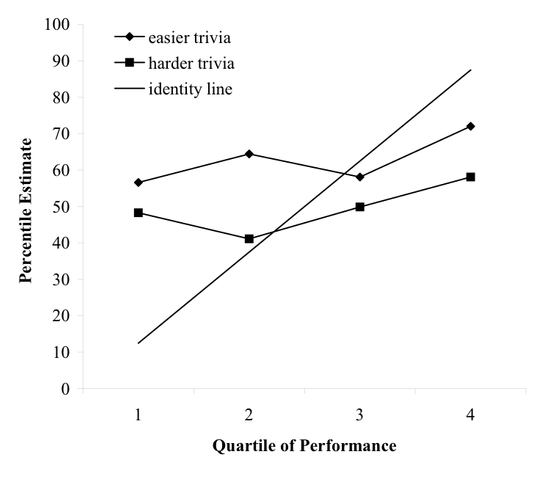The famous Dunning-Kruger effect is not a law that says 'incompetent people tend to think of themselves as competent'

Many people who frequently follow news or blogs about cognitive science and psychology have probably seen the term '
what the Dunning-Kruger effect is and isn't – [citation needed]
http://www.talyarkoni.org/blog/2010/07/07/What-the-Dunning-Kruger-effect-Is-and-Isnt/
According to Tal Yarkoni, an associate professor of psychology at the University of Texas at Austin, the Dunning-Kruger effect refers to the tendency for people with poor performance to overestimate their abilities compared to others, and the tendency for people with good performance to underestimate their abilities compared to others. However, some articles and discourses that mention the Dunning-Kruger effect mistakenly claim that 'the more you're bad at a certain job, the more likely you are to think that job is your calling' or that 'the more likely you are to be less competent, the more likely you are to think that you're more competent.'
The following article succinctly summarizes common misconceptions about the Dunning-Kruger effect and the actual Dunning-Kruger effect.
'Only incompetent people overestimate themselves' is a mistake; in fact, even average people overestimate themselves - GIGAZINE

'The power of these fallacies is likely due to their implicit appeal to the just-world hypothesis ,' Yarkoni said. 'We all want to believe that people who brag about how good they are aren't all that great, and it's extremely unpleasant to face the possibility that they might actually be better than us.'
Yarkoni then introduced the following three points that provide clues for a deeper understanding of the Dunning-Kruger effect:
1. Reversion to the mean
Regression to the mean is a phenomenon in which if a biased result is obtained in one trial, the next trial is more likely to produce results close to the average. According to Yarkoni, the most common criticism of the Dunning-Kruger effect is that it simply reflects regression to the mean.
Self-evaluation of grades is influenced by a variety of factors, including not only the grades themselves but also the individual's personality, measurement error, and cognitive ability regarding one's own cognitive ability, i.e., metacognitive ability, so the self-evaluations of people with extremely high or low grades are basically within a reasonable range. Yarkoni says that this may be the true nature of the overestimation and underestimation seen in the Dunning-Kruger effect.
◆2: Self-evaluation bias
Research by David Dunning, who proposed the Dunning-Kruger effect, and others has confirmed the phenomenon that 'the difference between the self-assessment and actual performance of incompetent people is larger than the difference between competent people,' which cannot be explained by regression to the mean. ' Self-assessment bias ' compensates for this shortfall. Self-assessment bias is the tendency for people to view themselves in an overly positive light. Competent people underestimate their own performance due to the Dunning-Kruger effect, but this is offset to some extent by self-assessment bias, so the degree of underestimation is smaller. This leads to the difference in self-assessment between competent and incompetent people mentioned above.
◆3: Errors due to task difficulty
Psychologists have conducted a number of follow-up experiments to verify Dunning's research, including one conducted by Katherine Burson of the University of Michigan Ross School of Business and others, in which University of Chicago students were given easy and difficult tasks to complete and the relationship between their performance and self-evaluation was examined ( PDF file) .
Below is a graph showing the results of Burson's research. The vertical and horizontal axes represent self-evaluation and grades, respectively. When it comes to easy tasks, as shown by diamonds, 'people with good grades' evaluate themselves more accurately, while when it comes to difficult tasks, as shown by squares, 'people with poor grades' evaluate themselves more accurately.

Regarding the relationship between this study and the Dunning-Kruger effect, Yarkoni said, 'When a task is difficult, people often think, 'I must have done worse than other people.' Conversely, when a task is easy, people will think, 'I must have done better than other people.' As a result, competent people are more accurate at self-diagnosing when the task is easy, and incompetent people are more accurate at self-diagnosing when the task is difficult. And the tasks that the subjects performed in Dunning's study were relatively easy.'
Yarkoni continued, 'When applying the Dunning-Kruger effect to people close to you, remember that there is a confirmation bias , which is when you only gather information that supports your beliefs. If you believe that 'incompetent people are not competent enough to realize that they are incompetent,' it will be easy to find evidence of this. In any case, the next time you feel like blaming your nasty coworker's boasting on the Dunning-Kruger effect, remember that you don't need to assume that your coworker is just an asshole and doesn't understand you.'
Related Posts:
in Free Member, Note, Posted by log1l_ks






